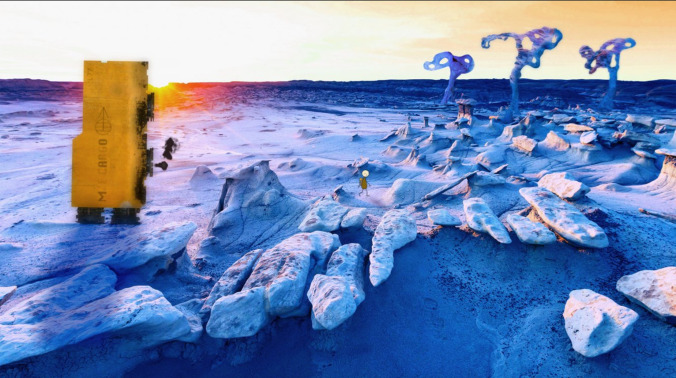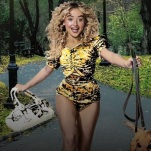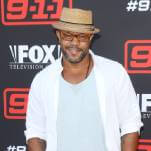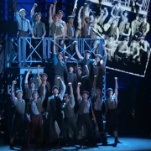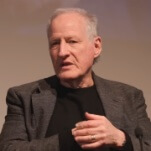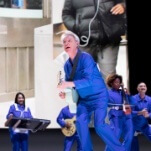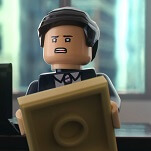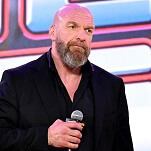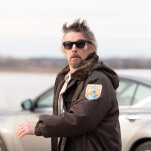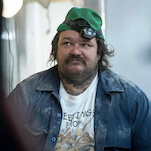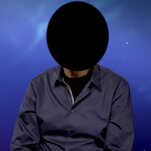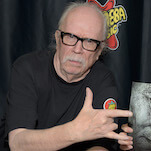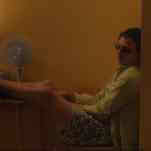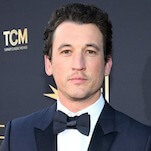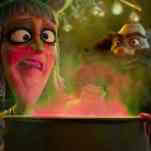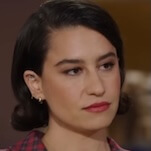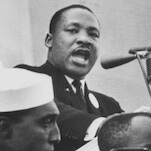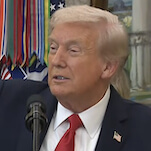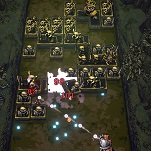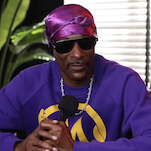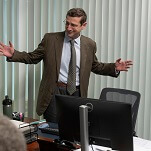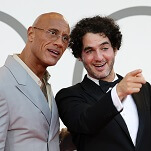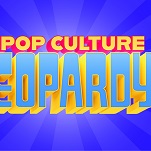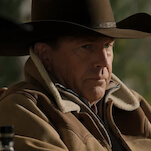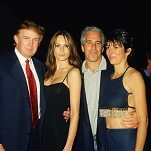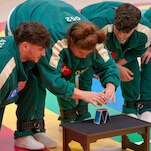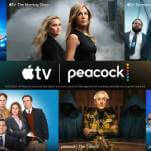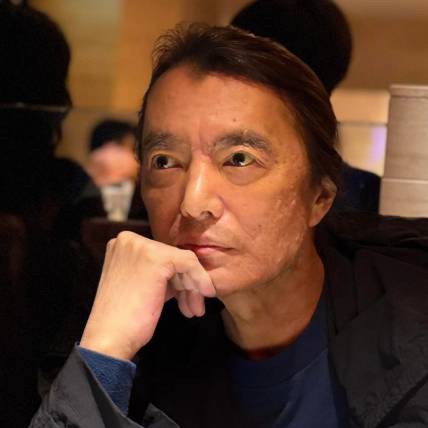World Of Tomorrow, Episode Three Image: Don Hertzfeldt
In 2000, Don Hertzfeldt released his first animated short film, Rejected, not long after graduating college. Its nine-minute runtime includes silly hats, giant spoons, a talking banana, the end of the world, and copious amounts of an anonymous cotton candy creature’s ass blood. Although nominated, it somehow did not win Academy Award for Best Animated Short Film that year. Nevertheless, through file-sharing and streaming relics like Kazaa and Google Videos, Rejected soon became one of the internet’s first truly viral shares, solidifying Hertzfeldt’s hilarious nightmare fuel as a cult classic in the genre. Since then, the animator has released a string of near universally acclaimed animated projects—from It’s Such A Beautiful Day’s heart-wrenching, wondrous story of mental deterioration, to one of the strangest, saddest Simpsons couch-gags ever, to perhaps his most widely known series, World Of Tomorrow.
World Of Tomorrow (which we loved) and its first sequel, Episode Two: The Burden Of Other People’s Thoughts (which we equally loved), are widely considered masterpieces not just in terms of animation, but in science fiction storytelling, as well. Released digitally in October, Episode Three: The Absent Destinations Of David Prime continues Hertzfeldt’s awe-inspiring meditations on mortality, memory, and the frequent absurdity that is being alive. Via Zoom, The A.V. Club spoke with Hertzfeldt about making art during quarantine, the joys of solitude, and the appropriately endless possibilities for a World Of Tomorrow shared universe.
The A.V. Club: Did you ever intend for there to be multiple World Of Tomorrow chapters when you made the first one in 2015, like a WOT cinematic universe?
Don Hertzfeldt: Towards the tail end of it, I recorded my niece [the voice of toddler Emily Prime] a second time. She lives in Scotland, so I don’t get to see her very often. And so it was usually only during the holidays when the family would get together, but I could hang out with her and record her audio. I had such a fun time making the first one, and it was due to come out in January, so that December, I got to see her again. So I thought, “Well, I didn’t know what I’d get the first time, so let’s record her again.” I also knew that if I didn’t get anything usable, it’d be fine. I could just walk away, and I still had the first one.
AVC: The first two episodes are complex in their own ways, but what made you want to make such an intentionally convoluted third entry?
DH: [Laughs.] Yeah, so, there’s gonna be a lot of these. I can see this as a long-term thing. As a writer, but also as a fan of science fiction, I don’t want to get set into a pattern or formula. I felt like the first two movies really were just laying the groundwork. Like, here’s this universe, here’s the rules. But if we’re going to go to “Episode Whatever,” we need to get out and explore the universe, you know? I didn’t want to bring my niece back, and just kind of get too lazy.
It’s exciting for me to know we’ve established this universe, and now let’s really stretch it. Like, how far can we go? I like it when movies go over the top, [and Episode Three] also functions as a parody of science fiction. Whenever science fiction movies’ plots get so convoluted—I really just wanted to make fun of that. Like, let’s see how far we can push this in terms of a complete farce?
Also, the first two movies are just based on long conversations. They’re based on memories, and the environment is really changing around the character. They might walk from here to there and they chat, but it’s an internal story. That was the last rule I wanted to bust out of, for the third one. That really informed the writing, because I wanted to see the characters push the narrative themselves.
AVC: Do you remember when you first became interested in these concepts of time and memory?
DH: I don’t think so. There’s not, like, some kind of event. But it does reappear [in my films]. Obviously, I’m very interested in that part of life. It could come from all these neurology books that I got into when I was writing It’s Such A Beautiful Day. I researched disorders, because I wanted to make sure [the protagonist] had—even though it’s never really explicitly stated what’s going on with him in that movie—I wanted there to be something that I knew was going on, but was medically accurate. I studied all that very deeply, and obviously it struck some sort of chord.
I might have said this before, but what’s interesting to me about the technology of the World Of Tomorrow movies is, when we say we want to live forever—in the generic sense—it’s actually very specific. Because if I was like, “Okay, you could live forever, but you’ve got to be rebooted. Blank your memory, and then you can live another 10 years, and then we’re blanking again, right?” If that was the process, that’s not attractive. You realize that what makes you “you” is your memories, your experiences, everything that’s saved back there. It’s less interesting, then, to be blank. That’s terrifying. That’s a form of death. Without that, what form of personality would I have left?
AVC: It reminds me of that parable about the ship at sea, and repairing it piece by piece. At what point does it qualify as a new ship, or does it remain the same?
DH: I don’t know if it’s anything I’m consciously thinking, but you can look at it from a biological point of view. Every seven years, every cell in our body is replaced. Am I the same person as when I was 4? Is that little kid dead? [Laughs.] A lot of this is obviously things that I’m just interested in and working out myself, or things that I’m just worried or scared about. I look at a lot of things in It’s Such A Beautiful Day’s story, and to me, it’s like a time capsule. This is who I was then. These are the nightmares I had, and the things I was worried about, but I’m not that person anymore.
AVC: Did making these films allow you to process those fears?
DH: I wouldn’t go so far as to call it therapy, but I think it’s something that you can externalize, whether it’s a sculpture, or painting, or a movie. And at least it’s something that you can then—it’s out of your head. It’s there. It’s in a physical form, and maybe you can reckon with it maybe a little bit. But maybe I’m just defining art. [Laughs.]
But any story I write has to have some sort of personal in-road to me. It doesn’t have to be something that’s happened to me, but there’s got to be something that I’m relating to, or thinking about actively that makes it interesting. Especially when I’m animating and all alone, you need that carrot on a stick to keep it interesting.
AVC: Solitude and being “all alone” is a recurring theme for you. I read that you are exploring working with a staff going forward, to decrease time between films. Do you think that that will change the nature of your stories, or will they continue exploring solitary experience?
DH: That’s interesting. I don’t think it’s going to change the writing, because I’m probably still going to be writing all alone. It’s interesting, because I’ve worked [on animation] alone for so long drawing thousands of round little heads. I lived in Santa Barbara for a very long time, and I would go weeks without speaking to another person. And I was fine with it. I realized there’s a very big difference between being alone and being lonely.
I live with my girlfriend now, and we’re in quarantine. I think animators are very well suited for this lifestyle. We’re used to being alone and in our heads, and many of us prefer it. I don’t expect the writing to change, but I wouldn’t mind if it did. I think that might be very interesting.
AVC: There’s a lot of little oblique references to other sci-fi films and their themes in World Of Tomorrow. Do you have any favorites that come to mind?
DH: I’ve always thought Eternal Sunshine Of The Spotless Mind is—as a science fiction movie—underrated. Very few people consider it science fiction, which is strange. It’s just a perfect, beautiful movie. Back To The Future, of course, is wonderful. I’ve always thought the second one was a little underrated, and I kinda liked all the Martys backstage. I appreciate when any science fiction movie goes over the top and takes a risk. So many science fiction movies now, to me, just don’t get weird enough.
Years ago, [a friend] was watching one of my movies. And afterwards, he’s like, “Yeah, I really liked it. I was watching it, and I kept thinking to myself, ‘At a certain point, this movie needs to turn the corner.’ And then soon after, I thought that the movie turned the corner, and I liked it.” I had never heard that phrase before: “The movie turned the corner.” I loved that. So many movies don’t seem like they have—I don’t wanna say “the guts,” but they don’t turn that freakin’ corner. When I was making [Episode Three], I was like, “How many corners can I cut? Are there too many corners?” [Laughs.] But that’s the fun of it. If we’re gonna go there, then let’s really go there. And if we fall down and fail, at least it’s gonna be really interesting.
AVC: For all the explorations of humanity’s future in the World Of Tomorrow series, do you think it’s possible we’ll ever survive long enough to achieve any kind of current science fiction as our reality?
DH: I think the next couple months are going to be… [Laughs.] It’s interesting. I go back and forth on being optimistic and pessimistic. I can’t decide. I don’t even know what I am anymore. I feel like I’m a cynical optimist, if that’s even a thing. I don’t have a lot of faith in people. All of my life’s disappointments are just because of people. [Laughs.] But at the same time, I don’t think it matters. I think very little matters, and that allows me to be optimistic, in a weirder sense.
I don’t think I believe in, like, good and evil. I think most of the time, it’s “Everything is just a bunch of stuff that’s happening.” And I think that’s a big reason why you might not see a lot of villains in my movies. There are bad people in the world, obviously, but you rarely see the mustache-twirling villain. And that bothers me in a film, because it becomes so much less interesting. Like, Darth Vader is just this poor guy in a suit. There’s this character there. And I think that’s what makes [World Of Tomorrow’s] character of Emily so interesting, because on the one hand, she’s incredibly villainous. Her actions are super selfish, and she’s got no empathy for these characters. And I think there’s a very fair read of these movies that she’s a bad guy. And I could be talked into that, you know? But I think it’s more interesting when it’s played both ways. It could also be looked at as “Just a bunch of stuff that’s happening.”
AVC: Is there anything that gives you hope right now?
DH: It’s a cliché, but I’m middle-aged now, and I do think the younger generation gives me hope. Since I was a teenager, you keep hearing this statistic that the younger generation, if they just voted, if they just got their act together, they could sweep the election. They could direct this country and the world in any direction they wanted to. Left wing, right wing, whatever. Historically, they’re just difficult to organize. It’s like herding cats. But I do think that progress is going to happen. It’s slower in this country, but it’s inevitable: The old ideas are going to die.
